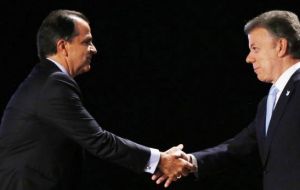MercoPress. South Atlantic News Agency
Santos-Uribe rivalry has turned the presidential campaign into a mudslinging contest
 The Colombian president and his main opponent Zuluaga (L), “don't learn the bad habits of your boss”
The Colombian president and his main opponent Zuluaga (L), “don't learn the bad habits of your boss”  Former president Uribe was elected Senator and wants an end to talks with FARC: they must turn their arms in
Former president Uribe was elected Senator and wants an end to talks with FARC: they must turn their arms in Accusations of bribes from drug traffickers, spying and email hacking have turned Colombia’s presidential election into an ugly slugfest that has further polarized a country trying to emerge from its violent past.
The mudslinging has distracted attention from talks with the country’s main rebel group to end the country’s half-century internal conflict, which had been expected to be a key issue going into Sunday’s election.
Much of the blame for the dirty campaigning falls on two former allies whose public feuding has divided Colombia the past four years: President Juan Manuel Santos and his still-powerful predecessor, Alvaro Uribe.
Despite presiding over what may be South America’s best-performing economy, Santos is struggling amid relentless attacks by Uribe and his hand-picked heir, former finance chief Oscar Ivan Zuluaga. Polls say the two are running neck and neck, well ahead of three other candidates but with neither likely to garner the 50% needed to avoid a runoff.
Zuluaga’s conservative Democratic Center movement has lambasted Santos for what it calls his softness in 18-month-old negotiations with the Revolutionary Armed Forces of Colombia, FARC. Zuluaga has threatened to end the talks in Cuba if he is elected, saying he will demand the rebels prove their commitment to peace by declaring a permanent cease-fire within a week.
But those policy differences have taken a backseat to endless bickering and near-daily bombshells that have Colombians shaking their heads in disgust.
It began with media reports that Santos’ campaign manager, J.J. Rendon, received 12 million dollars from the nation’s biggest drug traffickers to negotiate their surrender. The information was based on three-year-old, leaked testimony to Colombian prosecutors from a drug cartel boss jailed in the U.S.
Rendon, a Venezuelan native, quickly resigned after acknowledging that he interceded in the case, although he denied taking any money.
Two days later, authorities arrested a computer expert who worked for Zuluaga’s campaign, accusing him of hacking into the emails of FARC negotiators and even Santos. Zuluaga denounced the arrest as a ploy to derail his candidacy.
Uribe, without presenting any evidence, then accused Rendon of funneling 2 million dollars from the alleged drug-dealer payments to Santos’ 2010 campaign.
The waters were muddied even more with the appearance last weekend of a video shot clandestinely from a cell-phone in which Zuluaga listens attentively as the suspected hacker outlines a strategy to use intelligence gathered illegally to try to sabotage support for the peace talks.
And many Colombians, even those who support Santos, were asking whether the president was playing electoral politics with the peace process when he announced a landmark agreement with the FARC on May 17 to jointly combat illicit drugs. Many observers say he should have put the talks on hold until elections had passed.
Both Zuluaga and Santos “are trying to win at any cost,” said Marta Lucia Ramirez, a former Uribe defense minister and presidential candidate who was a distant third in the latest Invamer-Gallup poll. “That’s what’s causing damage to the country, that’s what destroying Colombians’ trust in their political leaders and institutions.”
The rancor between the two was on display Thursday night in the first candidate debate attended by Santos, in which the president suggested that Zuluaga would be Uribe’s “puppet” if elected. That triggered a feisty exchange.
“You must show me respect,” Zuluaga retorted with anger, banging his finger on his desk. “Just because you’re president don’t think you can say that. I have my own identity.”
Santos responded: “Calm down. Don’t learn the bad habits of your boss.”
Vicente Torrijos, a political analyst at Bogota’s Rosario University, said the onslaught of accusations was unlikely to tilt the election’s outcome.
“The society is so saturated with scandal that it produces the paradoxical effect of reinforcing voter preferences,” he said.
Santos, the scion of one of Colombia’s richest families, inspires little enthusiasm among voters, especially among the poor who have benefited less from the economic boom. And Zuluaga is widely viewed as Uribe’s subordinate. Yet none of their challengers appear to have been able to turn that to their advantage, perhaps because the mainstream media have focused on the two better-funded campaigns.
Whoever wins is going to have a tough time soothing the bitterness stirred up by the accusations. Congress is divided and Uribe, who was recently elected to the Senate, has promised to rally opposition against Santos should he win re-election




Top Comments
Disclaimer & comment rulesCommenting for this story is now closed.
If you have a Facebook account, become a fan and comment on our Facebook Page!